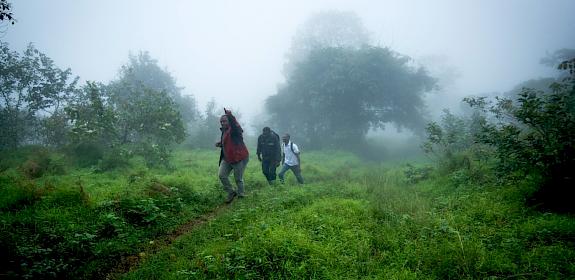Karnataka Forest Department prepare to curb illegal wildlife trade online
Kulgi (Dandeli), Karnataka, India, 1st April 2019—Last month TRAFFIC, in partnership with WWF-India, the National Tiger Conservation Authority (NTCA) and the Police Radio Training School (PRTS), Indore, organised a two-day training programme on monitoring and curbing illegal wildlife trade online for the forest officials of Kali Tiger Reserve, Karnataka.
The training was attended by 38 officials from Karnataka Forest Department and followed similar events held in Uttarakhand and Assam.
Traditionally, illegal wildlife trade takes place in clandestine physical markets. However, with India’s internet user population reaching nearly 500 million, cybercrime is of mounting concern and increasing detection and action against it is fast becoming one of wildlife trade's leading conservation priorities. Therefore, in December 2018, TRAFFIC, in collaboration with WWF-India, NTCA and PRTS introduced the new, specialised “Cyber CLAW” training programme for Forest Department officials.
The training workshop in Kali Tiger Reserve was conducted by specialists in the field of monitoring cybercrime and covered an overview of wildlife crime in the country; crime investigation; search and seizure techniques; communications device investigation; social media investigation; cybercrime scene management; digital forensics; digital intelligence collection; wildlife forensics; telecom surveillance; and data analysis.
Trainers included Dr Saket Badola, Head of TRAFFIC’s India office; Mr Varun Kapoor, Additional Director General, Madhya Pradesh Police; Mr Malay Mahant, Incharge Training, PRTS Indore; Mr Afzal Khan, Incharge Technical Cell, PRTS Indore; and Pramod K. Yadav, Senior Project Officer with TRAFFIC.
Traffickers and criminal networks are exploiting e-commerce websites and social media platforms to trade in illicit wildlife products: it is vital to have a tech-savvy response to this new form of organised wildlife crime.
Dr Saket Badola, Head of TRAFFIC’s India office
“Karnataka is rich in wildlife, has a long coastline, and needs to be on high alert against all forms of poaching and the wildlife trafficking that extends to marine species, including sharks,” added Dr Baqdola.
Mr Varun Kapoor said: “Smart monitoring of social media helps reveal useful information regarding the activities of wildlife criminals. However, cyber space dynamics rapidly change—there is an ongoing need to understand and combat newly emerging phenomena in wildlife cybercrime.”
Mr B. V. Patil, Director of Kali Tiger Reserve, said that the training workshop would help Kali Tiger Reserve staff to improve their response to emerging challenges, such as the use of cyberspace for illegal trade. He also spoke about other initiatives to curb wildlife crime, including the wildlife sniffer dog squad deployed by the Reserve.
Mr Ashok Bashakod, Chief Conservator of Forest, Karnataka added: “Besides knowledge and skills there is also a need to equip the Forest Department with modern tools and techniques to help monitor wildlife cybercrime.”
Further “Cyber CLAW” training programmes are planned for forest officials in Tiger Reserves across India.





